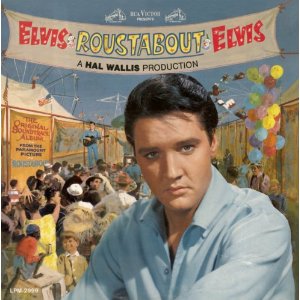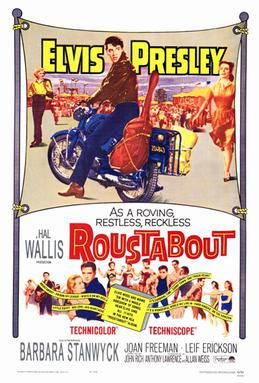From Wikipedia, the free encyclopedia
| Roustabout | |
|---|---|
| Soundtrack album by Elvis Presley | |
| Released | October 20, 1964 |
| Recorded | March 2 & 3, April 29, 1964 |
| Studio | Radio Recorders |
| Genre | Pop, rock |
| Length | 20:05 |
| Label | RCA Victor |
| Producer | Joseph Lilley |
| Elvis Presley chronology | |
| Viva Las Vegas (1964)Roustabout (1964)Girl Happy (1965) |
| Review scores | |
|---|---|
| Source | Rating |
| Allmusic |
Roustabout is the ninth soundtrack album by American singer and musician Elvis Presley, released on RCA Victor Records in mono and stereo, LPM/LSP 2999, in October 1964. It is the soundtrack to the 1964 film of the same name starring Presley. Recording sessions took place at Radio Recorders in Hollywood, California, on March 2 and 3, and April 29, 1964. It peaked at number one on the Billboard Top LPs chart. It was certified Gold on May 20, 1988 by the Recording Industry Association of America. The album would be Presley’s final soundtrack to reach number one and his last number one album until 1973’s Aloha From Hawaii: Via Satellite.
Content
Payments to Presley for each film amounted to between $225,000 to $1,000,000 up front, often half the budget for production, with a 50% share of the profits. These movies were being shot in sometimes as little as three weeks, with the complete scoring and recording of the soundtrack albums taking no more than two weeks. It fell to Freddy Bienstock, the assistant of Presley’s manager, Colonel Tom Parker, to ensure that the soundtrack songs fit into the profit equation with the publishing controlled by Elvis Presley Music or Gladys Music, the Hill and Range Publishing companies owned by Presley and Parker. As a result, successful writers such as Doc Pomus and Mort Shuman, Otis Blackwell and Winfield Scott, and Don Robertson lost interest in adhering to the needs of the grind. It was interlocking self-promotion, causing one MGM employee to remark that the movies “didn’t need titles. They could be numbered. They would still sell”.
Blackwell and Scott in fact submitted a candidate for the title track, “I’m a Roustabout” recorded on March 3, only to find it substituted by a song from a different team of writers. This recording was eventually released by RCA on the 2003 compilation 2nd to None.
Presley and his coterie of top session musicians gamely plowed through all of this, and eleven songs were recorded for the twenty-minute soundtrack LP. Four songs from this album appeared on the 1995 soundtrack compilation, The Essential 60s Masters II: “Roustabout”, “Little Egypt“, “Poison Ivy League”, and “There’s a Brand New Day on the Horizon”.
Personnel
- Elvis Presley – vocals
- The Jordanaires – backing vocals
- The Mello Men – backing vocals (on “Roustabout”)
- Boots Randolph – saxophone
- Scotty Moore – electric rhythm guitar
- Billy Strange – electric lead guitar
- Tiny Timbrell – acoustic rhythm guitar
- Floyd Cramer – piano
- Dudley Brooks – piano
- Bob Moore – double bass
- Ray Siegel – double bass
- D. J. Fontana – drums
- Buddy Harman – drums
- Hal Blaine – drums
Roustabout The Movie
| Roustabout | |
|---|---|
| Theatrical release poster | |
| Directed by | John Rich |
| Screenplay by | Anthony LawrenceAllan Weiss |
| Story by | Allan Weiss |
| Produced by | Hal B. Wallis |
| Starring | Elvis Presley Barbara Stanwyck Joan Freeman Leif Erickson |
| Cinematography | Lucien Ballard |
| Edited by | Warren Low |
| Music by | Joseph J. Lilley |
| Production company | Hal Wallis Productions |
| Distributed by | Paramount Pictures |
| Release date | November 10, 1964 (USA) |
| Running time | 101 minutes |
| Country | United States |
| Language | English |
| Box office | $3,300,000 (US/ Canada rentals) |
Roustabout is a 1964 American musical feature film starring Elvis Presley as a singer who takes a job working with a struggling carnival. The film was produced by Hal Wallis and directed by John Rich from a screenplay by Anthony Lawrence and Allan Weiss. The screenplay was nominated for a Writers Guild of America award for best written American musical although Roustabout received a lukewarm review in Variety. The film’s soundtrack album was one of Elvis Presley’s most successful, reaching no. 1 on the Billboard Album Chart. It was filmed in Techniscope at Paramount Studios with location for carnival sequences shot in Thousand Oaks, California. Filming began in March 1964.
Plot

By CC BY-SA 3.0, Link, The Honda 305 Superhawk motorcycle used in the film
Musician Charlie Rogers is fired from a job at a teahouse after brawling with several college students in the parking lot. After a night in jail, Charlie hits the road on his Honda 305 Superhawk motorcycle. He spots Cathy Lean driving with her father Joe, and their employer, Maggie Morgan. When Charlie tries to become friendly with Cathy, Joe forces him off the road and the bike is wrecked after crashing into a wooden fence.
Maggie offers him a place to stay and a job with her struggling traveling carnival while the bike is being repaired. Charlie becomes a “carnie”, a roustabout. Maggie recognizes his musical talents and promotes him to feature attraction. His act soon draws large crowds. Off stage, Charlie romances Cathy, which creates animosity with Joe. After the two men repeatedly clash and Charlie is accused of holding back a customer’s lost wallet that Joe was accused of stealing, Charlie leaves to star in the much better financed show of rival carnival producer Harry Carver.
Once again, he is a great success. However, when Charlie learns that Maggie is facing bankruptcy, he returns to her carnival. In the musical finale, he is happily reunited with Cathy.
Cast
- Elvis Presley as Charlie Rogers
- Barbara Stanwyck as Maggie Morgan
- Joan Freeman as Cathy Lean
- Leif Erickson as Joe Lean
- Jack Albertson as Lou, a teahouse manager
- Sue Ane Langdon as Madame Mijanou, a fortune teller
- Pat Buttram as Harry Carver
- Joan Staley as Marge
- Dabbs Greer as Arthur Nielsen
- Steve Brodie as Fred the Pitcher
- Norman Grabowski as Sam
- Lynn Borden as a college student
- Jane Dulo as Hazel
- Joel Fluellen as Cody Marsh, another roustabout
- Wilda Taylor as Little Egypt, the principal dancer in the number “Little Egypt”
Uncredited actors listed alphabetically:
- Beverly Adams as Cora, a dancer
- Billy Barty as Billy, carnival midget
- Teri Garr as College Girl. Garr can also be seen as a backup dancer during several musical numbers.
- Joy Harmon as College Girl
- Richard Kiel as Strongman. Kiel is better known for playing “Jaws” in the James Bond movies The Spy Who Loved Me (1977) and Moonraker (1979)
- Kent McCord as Carnival Worker
- Raquel Welch as College Girl
- Red West as Carnival Worker
Musical numbers
See also Roustabout (soundtrack)
- “Roustabout” by Bill Giant, Bernie Baum and Florence Kaye
- “Poison Ivy League” by Bill Giant, Bernie Baum and Florence Kaye
- “One Track Heart” by Bill Giant, Bernie Baum and Florence Kaye
- “Wheels On My Heels” by Sid Tepper and Roy C. Bennett
- “It’s a Wonderful World” by Sid Tepper and Roy C. Bennett
- “It’s Carnival Time” by Ben Weisman and Sid Wayne
- “Carny Town” by Fred Wise and Randy Starr
- “Hard Knocks” by Joy Byers
- “There’s a Brand New Day On the Horizon” by Joy Byers
- “Big Love, Big Heartache” by Dolores Fuller, Lee Morris and Sonny Hendrix
- “Little Egypt” by Jerry Leiber and Mike Stoller
- “I’m A Roustabout” by Otis Blackwell and Winfield Scott, a different and unreleased theme song for the movie
All tunes in the film were sung by Presley.
Reception
Roustabout reached #8 nationally at the box office in 1964 based on the Variety survey. The film finished as #28 on the year-end list of the top-grossing movies of 1964 and earned $3 million at the box office.
The New York Times writer Howard Thompson complained about “little in the way of dramatic substance” and that the movie wasn’t “nearly so trim a package” as Fun in Acapulco or Viva Las Vegas, but noted that Elvis was “perfectly cast” and “surprisingly convincing in his role.” Variety was lukewarm, faulting mainly a script “loaded with clichés”, but noted the film would likely be a box-office hit based upon its star names, songs, and “Technicolor, Techniscope frame.” John L. Scott of the Los Angeles Times called the film “a trite, cliche-ridden story that has been thrown together to showcase Elvis Presley and his vocalizing. It serves its purpose well, and probably will prove a box office bonanza for producer Hal Wallis.” The Monthly Film Bulletin wrote, “Presley vehicles have sadly deteriorated since the days of Follow That Dream, and this amiable but uninspiring piece does nothing to halt the process, despite curiosity value provided by Barbra Stanwyck, back with Paramount for the first time in ten years.”
Awards and honors
The film’s screenwriters, Anthony Lawrence and Allan Weiss, were nominated for the Writers Guild of America Award for Best Written American Musical. The film generated a best-selling soundtrack album that went #1 on the Billboard charts. The soundtrack album would be Presley’s final #1 soundtrack and last #1 album until 1969’s From Elvis in Memphis, which topped the charts in the U.K.
Watch The Movie








































































Comments